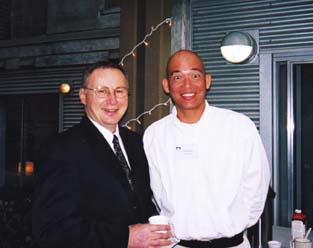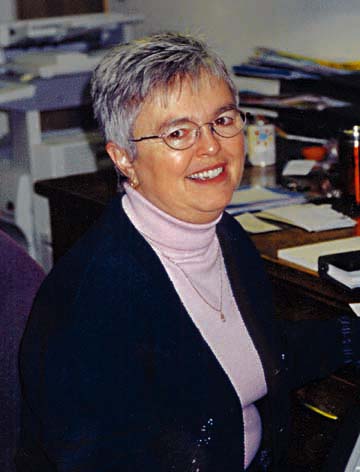Volume 7, number 2
January 27, 2003
Housing opened in poor Vancouver neighbourhood
Vancouver, B.C.
Photo: Lorne Epp (left) and David Deocera, manager, participated in the grand opening for Candela Place in Vancouver.
 I didn’t think I had a chance to get in here because I wasn’t close enough to God,” said Phil, a resident in the newest project of the Social Housing Society of Mennonite Central Committee British Columbia. Phil had been living on the streets of Vancouver for nearly five months before he came to live in Candela Place, which celebrated its grand opening on December 8.
I didn’t think I had a chance to get in here because I wasn’t close enough to God,” said Phil, a resident in the newest project of the Social Housing Society of Mennonite Central Committee British Columbia. Phil had been living on the streets of Vancouver for nearly five months before he came to live in Candela Place, which celebrated its grand opening on December 8.
Candela Place is the first project that the MCC housing society has done with a partner, the Coast Foundation, which provides housing and services to people with mental illness. Twenty of the sixty units in the building are reserved for people with mental health issues.
Candela Place is also the first MCC housing project for homeless people in one of Vancouver’s rougher neighbourhoods. (Three other projects provide housing to low-income families; the society also runs the Supported Independent Living program for people with chronic mental illness.)
“Candela” means “candle” and it seems that Candela Place will truly be a light on Granville Street where porn shops, rundown hotels and pan-handlers are the norm. Dignitaries praised MCC Social Housing for its commitment to providing quality housing and care for forgotten people. But it was the comments from tenants that showed what a special place Candela already has become.
“I feel truly blessed to live here,” said Jeff. “MCC’s motto is ‘More than a roof’ and they certainly have shown that to us.”
Residents proudly showed guests their studio-style suites, each with a small kitchen and bathroom. The latter amenity was obviously a unique experience for many residents judging from the many comments they made. Lorne Epp, executive director of the society, shared the organization’s commitment to share faith in God through service. “It is a hallmark of our faith to serve our community—the poor in spirit are blessed and honoured in the sight of God. This building is our act of worship and we’re grateful for the opportunity to serve God in this way.”
Ingrid Schultz, pastor at First United Mennonite Church in Vancouver, closed the ceremonies with a prayer of blessing: “We remember, in this time of Advent, when you came to make your home among us.” She asked God to make Candela Place a light in the darkness.
As for Phil, who thought he was too far from God to live in a place like Candela, the light has entered the darkness of his life. He has moved from homelessness and alcohol abuse to being alcohol-free.
“With God’s help, my sponsor’s encouragement and a lot of prayer, I’ve been alcohol free for nearly two years now,” he said. “I’ve learned that generosity is God’s love in action...from here on in I want to be known as a generous person.”
—Angelika Dawson
Secretary is front-line church worker
Photo: Friesen
Ruth Friesen is clear about the central role of a church secretary: “I am a front line worker, the first person that individuals connect with on the phone or when they walk in the door. Their perception of the church is very much coloured by how I receive them.... The secretary gives a public face to the institution.”
 Friesen, a member of First Mennonite Church in Edmonton, began as part-time administrative assistant for the Dayspring Presbyterian Church in 1989. Currently, she is paid for 22 hours per week. Friesen grew up in a Presbyterian church and her parents attend Dayspring.
Friesen, a member of First Mennonite Church in Edmonton, began as part-time administrative assistant for the Dayspring Presbyterian Church in 1989. Currently, she is paid for 22 hours per week. Friesen grew up in a Presbyterian church and her parents attend Dayspring.
“When I first took the job,” she recalls, “I don’t know that I would have described it as a calling.... As I’ve seen how important the job can be in determining the effectiveness of how the church office reaches out to the congregation and community, I see it more as a ministry. It is a service to the church.”
The role of church secretary is often misunderstood as simply answering the phone and producing a bulletin. An effective secretary possesses good communication and organizational skills, is able to work amidst frequent interruption, is an effective diplomat, can work with computers and photocopiers, and has a heart for and understanding of the mission of the church. The variety of situations a secretary faces can be endless, from sorting through mail to fielding complaints to dealing with requests by people off the street.
When Friesen began her job, the Dayspring congregation gave her the title of administrative assistant, helping people develop a new perception of the position.
“I’ve appreciated being called administrative assistant,” she says. “It allows me to think beyond the traditional secretary notion and it brings the congregation along, allowing them to see the job as more than someone who produces the bulletin.”
She adds, “When I was hired, it was clear that my primary role was to assist the minister, not to be secretary to the whole congregation.”
Ruth has found that working for a congregation other than her own is full of positives.
“I highly recommend it,” she states enthusiastically. “I can go to worship on Sunday and be free of my work. I can also be dealt with as an employee separate from my membership, which is a pro for both parties. I am not involved in the politics and the congregation can deal with me in a more objective way. If I messed up they can tell me without pussy-footing around. I can also have real conversation about what’s not working.”
Friesen ends with a gentle challenge to congregations: “The United Church has a secretaries’ association and benefit plan. I’d like to challenge other denominations to seriously address this idea. It says something about how we value the position and sets parameters for treatment and pay.”
—Donita Wiebe-Neufeld
Outstanding secretary fills many roles
Photo: Gingerich
 Darlene Gingerich has served as secretary at Steinmann
Darlene Gingerich has served as secretary at Steinmann
Mennonite Church in Baden, Ontario, for 14 years. When she began, she found it the perfect job for a mom with a one-year-old and five-year-old twins. One-quarter time with flexible hours gave her the opportunity to keep up her work skills and her family responsibilities.
“This was the perfect job,” said Gingerich. “Being available to my family was my top priority.” She worked out of her home and was responsible for the weekly bulletin, annual meeting report and extra jobs given by the pastor.
As the responsibilities increased, Gingerich moved her “office” to the church. It was perfect timing again, because her youngest child had just begun school. To make room for Gingerich in the church building, the trustees turned part of a classroom into an office for her, the same space that she works in today.
Gingerich has been a constant source of encouragement and information to many pastors. She is the resident expert on the workings of the church structure, whom to call for different problems, and a connoisseur of coffee. She always has time to help with a problem, from how to get into a locked cupboard to how the church will host six committee meetings in one evening.
She is very organized, thorough and creative. She has a quick smile and an easy laugh, putting people at ease immediately. Gingerich spends many extra hours “finishing up” reports that have been handed in late, and adjusting her schedule to last-minute meetings or responsibilities.
Being a secretary really means making the church part of your family. Gingerich is on call day or night when problems arise. Her sense of humour shines through when machines break down, and she is trying to convince a repairman that, “no, this machine has never made this noise before; I know something is wrong.”
In January, Gingerich began working full-time as an administrative assistant. She looks forward to the extra day a week to “catch up” on extra work. Above all, she truly enjoys her job. This is evident in the way she has carried out her evolving responsibilities, and her care for all who enter the church building.
Former pastors, at farewell services, have mentioned the wonderful support and encouragement Gingerich provided. Our church reaps tremendous benefits from having her in this job.
—Joy Wagler
Copyright for the contents of this page belongs to the Canadian Mennonite. Please seek permission to reprint from the editor .